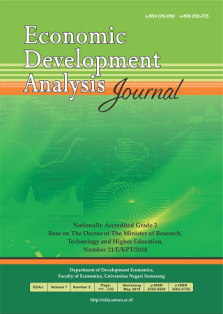Does Fiscal Decentralization Increase the Economic Growth in Sulawesi Island?
Abstract
Fiscal decentralization in Indonesia has been carried out since the issuance of Law No. 22/1999 which requires the central government to hand over financial management authority to local governments. Fiscal decentralization can create efficiency and effectiveness to encourage economic growth. However, there are still problems, namely whether the delegation of authority can contribute to regional economic growth. This study was conducted to determine the effect or impact of fiscal decentralization on the economic growth of six provinces on the island of Sulawesi. The central government assists the regions through fund transfer schemes such as GAF, SAF, and RSF. This study uses data from six provinces on Sulawesi Island between 2005-2019 and looks at the amount of fiscal decentralization used, namely the ability of regional transfers to create economic growth (AII) and the ability of local revenues to contribute to economic growth (AIII). The results of the analysis show that the indicator of the ability of transfer funds to the formation of regional original income has a positive and significant relationship. This means that, judging from the ability of the regions to contribute to economic growth, they are still unable to increase economic growth without the help of the central government.


